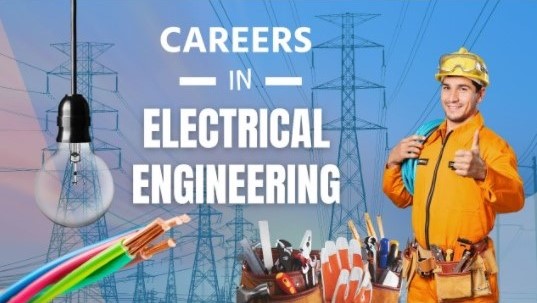Article- Electrical Engineering
What is Electrical Engineering all about?
Electrical engineering is the branch of engineering that studies use of electricity, electronics and electromagnetism – which have all become so important for us today that we cannot imagine our lives without them. Electrical engineering has grown so much that it now covers vast number of fields like microelectronics, communications, power systems & power electronics, control, signal processing, instrumentation, E-mobility, renewable energies etc. Many of these disciplines overlap with other engineering branches, leading to a huge number of specializations.
Some people feel that electrical engineering is only about circuits. This is not true as it has subdivisions (like Signal processing, or communication) which involve very less of circuits. Semiconductors is part of 12th standard syllabus, some students do not like it and so avoid choosing electrical engineering because of that. Also, the study of semiconductors constitutes only a part of Electrical engineering. There are subfields that are completely independent of it.
B.Tech. Program
The four year Bachelor of Technology (B.Tech. or B.E.) program consists of eight semesters. The Electrical engineering curriculum is designed to give exposure to a wide spectrum of related fields. Core courses in Telecommunications, Microelectronics design, Power Electronics and Power System, Control System and Embedded Systems help give a B.Tech student an overview of all areas in the Electrical engineering department. Further, by pursuing an Honours (taking extra courses) or in the course of the final year project, B.Tech students have the opportunity to specialize in the area of their interest.
What is syllabus for Electrical engineering?
- First Year: Curriculum is almost the same for all streams. The common courses that you will do on Mathematics, Modern Physics, Computer programming will be quite useful for the subsequent years.
- In the second and third year, you will do a few courses from each subfield. You will learn basics about electronic devices, computer architecture, circuits, control systems, communication, signal processing and transmission methods. Also by the end of the third year, you would have done some Math courses (on probability, transforms etc.) that would help you in the courses you take later. Almost all core courses will be over by the end of the third year. The rest of the course work involves electives where you can choose to study advanced topics in the sub-fields like Microelectronics, Communications, Signal Processing etc.
- Fourth year: It is very flexible, most of the curriculum comprising electives. Choosing your own electives provides you the freedom to either dive deeper in a particular area or to pursue multiple areas.
Core specializations:
Here is some more information on the different fields in Electrical Engineering in general:
- Microelectronics and VLSI Design: This field refers to the design of circuits and devices that power the latest slim smartphones, the next generation processors. Work in this area can be categorized into device level, circuit level work and processor level work.
- Power Electronics and Power Systems: Energy can be sourced from various source like thermal, hydro, nuclear, solar, wind etc. Whatever be the source of energy, it is converted into electrical energy which is easier to transmit as well as use. This field concentrates on improving the conversion mechanisms and the transmission.
- Control and Computing: Control systems are designed to regulate, monitor and precisely control the behaviour of systems or device. An example of a control system would be the system used to track satellites or a system that automatically closes or opens a dam based on water levels.
- Electronic Systems: This group deals with application oriented systems with integrated and (or) embedded electronics like: the washing machine that’s programmable, or the mobile phone that comes with an inbuilt blood pressure sensor.
Job Opportunities:
The job opportunities of power engineering domain are broadly classified in to mainly two sectors.
- Government Sector: As far as power system engineering domain is concerned, the following opportunities are available:
- Power Generating Companies or GENCOs (GSECL, NTPC, BHEL)
- PSUs (Power System Operation & Control [POSOCO], PGCIL, ONGC, BARC etc.)
- Power Transmission Companies or Transcos (Power Grid Corpn., GETCOs)
- Power Distribution Companies or Discoms (PGVCL, MGVCL, UGVCL, DGVCL and other state utilities)
- Government Sector: As far as power system engineering domain is concerned, the following opportunities are available:
All the PSUs are recruiting based on the GATE score performance. However, state utilities like GETCOs, PGVCL, MGVCL, UGVCL, DGVCL and other state utilities are recruiting based on their own examinations.
- Private Sector: As far as power system engineering domain is concerned, there are many reputed companies in this field like: Siemens, Asea Brown Boveri (ABB), General Electric Co. (GE), Larsen & Turbo (L & T), Crompton Graves Ltd., Tata Power Ltd., Adani Electricity Power Limited (AEML), Enphase Energy, Bajaj Auto, Eaton Corporation, Mercedes Benz etc.
Recent Trends in Electrical Engineering:
Apart from usual fields as discussed above, following two areas are fast emerging for future opprotunities.
- E Mobility: Electromobility known as e-mobility is the principle of using electric propulsion for transportation such as: cars, buses, trucks etc. E-mobility allows us to move away from fossil fuels towards energy supplied from electrical power sources which are, in turn, charged through the electricity grid.
- Renewable Energy Sector: Renewable energy systems are rapidly becoming more efficient and cheaper and their share of total energy consumption is increasing, with a large majority of worldwide newly installed electricity capacity being renewable. It is estimatd that there are over 10 million jobs associated with the renewable energy industries globally, with solar being the largest renewable employer.
Under-Graduate or UG Admission: The admission for undergraduate studies in IITs/IISc/IIITs (Tier- I colleges) and NITs (Tier- II) colleges is done based on (JEE/JEE-Advanced). The admission for undergraduate studies in Tier III colleges is done based on State Board examination (60%) and Entrance Exam (40%), for example GUJCET (Gujarat Common Entrance Test). Some private deemed universities like BITS-Pilani conduct their own entrance test as well.
Post-Graduate or PG Admission: The admission for post graduate studies IITs/IISc/IIITs (Tier- I colleges) and NITs (Tier- II) colleges is done based on GATE scores and admission in Tier III colleges is done based on PGCET (Post graduate common entrance test) of respective states. The syllabus is almost same as that of GATE examinations.
What about further studies after Electrical Engineering?
The following areas can be pursued as a specialization for further higher studies (M.Tech./ M.S. or Ph.D.), as there is a lot of research going on in these fields:
- CSP (Communication and Signal Processing)
- Control and Computing
- Power engineering and Power systems
- Integrated Circuits and Systems
- Electronic Systems
- Solid State Devices
Study Abroad vs. Job Opportunities: Many students who are interested in research go for M.S./Ph.D. in their area of interest. There is a significant overlap with computer science in some fields, so some students also go for M.S. in Computer Science. As far as job opportunities are concerned, the ample opportunities are available after having completed M.S/Ph.D. If you would like to pursue your higher studies abroad, it is advisable to compare and choose good universities. You can check and compare QS rank of an university.
About Me: To briefly introduce myself, I am Chintan Dixit, son of Suresh Jivalal Dixit and Harsha Dixit, Bhavnagar, Gujarat. I am working as a Project Engineer, Dept of Electrical Engineering, IIT Mumbai. I did my graduation and post-graduation from Shantilal Shah Engineering College (SSEC), Bhavnagar, Gujarat. I have worked in close association GETCO (Gujarat Energy Transmission Corporation Ltd) and other state utilities during my M.E. work for actual field testing of power transformers.
After that, I have been working at Dept. of Electrical Engineering, IIT Bombay as a project engineer in a consultancy project of Adani Electricity Mumbai Limited. My role mainly involves design and development of software tools for monitoring and diagnostics of power transformers, Electromagnetics/Coupled field computation, Insulation Diagnostics, High Voltage engineering.
Quote: कठिन रास्ते सुंदर गंतव्य की ओर ले जाते हैं!!! Like many youngetrs, I also had my doubts & anxieties about choosing the right career path. I hope this write-up helps you get clarity about your career as well, wishing you All the Best!
For more information, you may reach out to me on my below mentioned contact details: my Mobile No. is: +91 81409 74221, my E-mail ID is: chintan.dixit9008@gmail.com.




